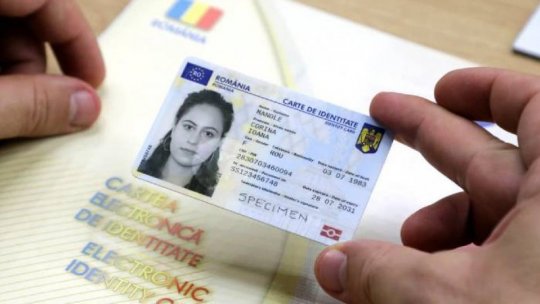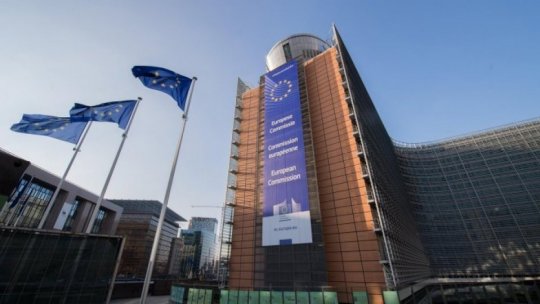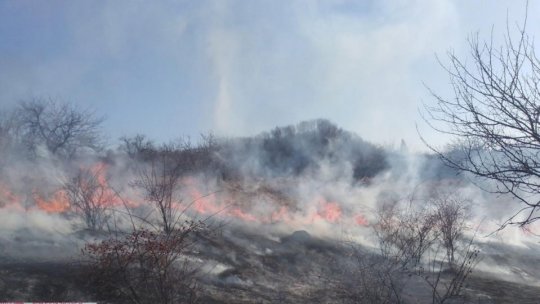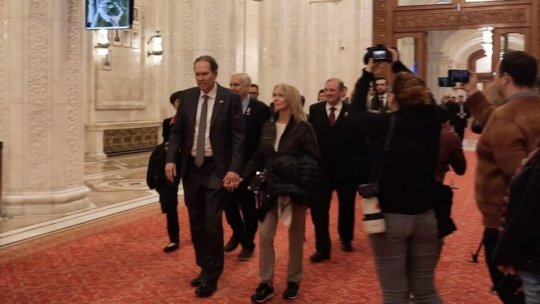Romanian PM and EP President Joint Press Conference in Strasbourg
Joint press conference of EP President Antonio Tajani and Romanian PM Viorica Dăncilă.
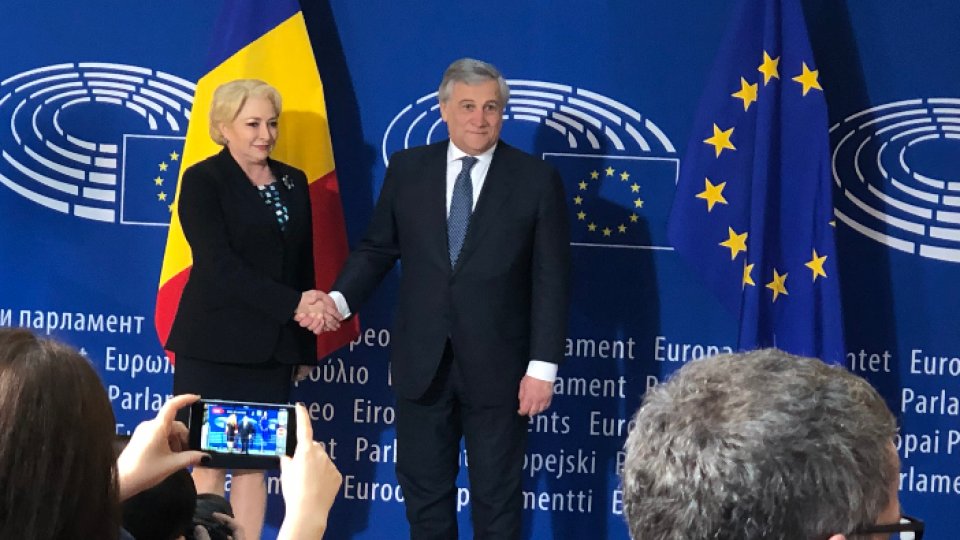
Articol de Radio România Actualităţi, 15 Ianuarie 2019, 23:40
Romanian Prime Minister, Viorica Dăncilă, and European Parliament President Antonio Tajani had a joint press conference on Tuesday, in Strasbourg, following presentation of Romanian Prime Minister of the program and agenda of the Romanian EU Council Presidency.
European Parliament Antonio Tajani: I want to underline the support of the European Parliament for the Romanian Presidency. We need to work hard to achieve a solution for the package on immigration. For the European Parliament, the Dublin Reform is a priority, the European Parliament wants to achieve an agreement with the EU Member States on that (…). Upcoming European Elections are another important issue. We also we want to have an agreement on the future Multiannual Financial Framework (MFF), which is not easy. Other important dossiers - unemployment, youth, terrorism and defense of EU border, where we are counting on the support of the Romanian EU Presidency.
Prime Minister Viorica Dăncilă: I thank President Tajani and the European Parliament for the hospitality I have been welcomed in Strasbourg and for the opportunity to present, in the plenary session, our European vision mentioned in the program for our Presidency of the Council of the European Union. Our main objective is to contribute to creating a more united Europe, reason why we have chosen “Europe – a common European value” as our EU Presidency motto. I highly appreciate the support of President Tajani for our main objective. We both agree that without a united Europe we cannot hope to provide the necessary answers to the challenges the European Union is currently facing and to reach concrete results that our citizens are awaiting. We have 242 legislative dossiers on the current European Agenda that are waiting to be completed; they are difficult files, which need consensus and we hope that together with the European Parliament and the European Commission we will be able to finalize as many as possible. We also have to answer challenges the EU has never been confronted with until now, such as Brexit. We also have to think to the future of the European Union after UK’s withdrawal and in this sense, we will have the May 2019 Summit in Sibiu, Romania, where we will draft the future of the Union. The Multiannual Financial Framework represents another challenge, but we also have to pay a close attention to the traditional EU policies such as the Common Agricultural Policy and the Cohesion Policy, to immigration, asylum policy, EU defense or foreign policy. Romania will fulfill its role as an impartial mediator and consensus facilitator and we hope that our answers will reach citizens’ expectations, since it is important that citizens understand the tangible impact and the added value of the European project.
Questions from the Press
Robert Lupițu, Calea Europeana, Romania: One question for both senior officials. Mr President Tajani, you expressed expectations from Romania to accelerate as far as possible negotiations for the Multiannual Financial Framework. This MFF also includes a program called "Values and democracy in the European Union". Will you have a vote on Thursday on this program and on rules to freeze payments to countries that do not respect the rule of law? What concrete expectations do you have from the Romanian Presidency of the Council of the EU to advance negotiations on the MFF specifically on this issue, taking into account the possible opposition in the Council? Hungary and Poland would be two of the states - to set up an example - that can block this. And for the Prime Minister: advancing negotiations on MFF is a priority for Romania. What will be Romania’s position, as President of the Council of the European Union, on the issue of freezing payments to EU states that do not respect the rule of law or jeopardize it? Thank you very much!
Antonio Tajani: (...) As soon as possible, the general framework, and with regard to the various programs, we hope we can approve them before the European elections take place. We really insist on this and tried to make it clear to the Council that we cannot afford not to give answers to the citizens. We made proposals, with figures. We have called for the Community budget to grow from 1% to 1.3% and we have bet on own resources. We do not want to discuss for each program in part with the Council that what interests us. It is the adoption of the general framework, the multi-annual general framework, because how can you talk about the fund, for example, for the Common Agricultural Policy, while it is uncertain what will happen to the UK? We cannot discuss individual programs, so I cannot tell you now what will be Poland, Hungary or Romania’s position. We are not debating just individual programs.
Viorica Dăncilă: At this point, these issues are being negotiated within the Council. We must continue negotiations with the Member States and we must take into account the proposals made by the Member States. Otherwise, it is very important that any criteria related to the use of European funds be clear, transparent and come to the direct beneficiaries of European funds. I believe that these issues need to be taken into consideration and, as I mentioned earlier, the rotating Presidency should be an impartial mediator and bring consensus among the Member States.
Sabina Iosub, ANTENA 3, Romania. Mr Tajani, last week when you were in Romania you said you would call on the other Member States on the Schengen issue. We know very well that this is a double standard, but applies at European level in this issue to both Bulgaria and Romania, but the same double standard is found in other situations. What can you do as President of the European Parliament so that there is no difference between the citizens at EU level given that they are going to have such important parliamentary elections, as you pointed out a few minutes ago? Ms. Premier Viorica Dăncilă, how will the Romanian EU Council Presidency fight for the elimination of this double standard? Thank you.
Antonio Tajani: I reaffirm my position in favor of the entry of Bulgaria and Romania into the Schengen Area. It is an appeal that I launched in my official speech which I delivered last week in Bucharest. I did the same during the press conference. I have not changed my mind. For me, Bulgaria and Romania can enter without any problems in the Schengen Area.
Viorica Dăncilă: As you well know, Romania fulfills all the technical criteria for joining the Schengen Area. As early as 2011, the Commission has highlighted this, and I think that all countries should take this political decision, to give confidence in the EU, to trust that there is no difference in approaching different countries. I believe in the support of President Antonio Tajani, I believe in the support of European Commission President Jean-Claude Juncker and I believe that this political decision that Romania joins the Schengen area is a decision that should be taken by the end of the Romanian EU Presidency, even before the European Parliament elections, because this would give more confidence in the EU, it would show that there are no first hand and second-hand countries or first-hand and second-hand citizens. I think it is an act of justice that is done for the two countries and I think this should be done through discussions, by resuming talks with the countries that are opposed to Romania's accession to the Schengen area. I will personally do this, and this must also be done by the President of Romania, and I think this discussion should also take place in the Justice and Home Affairs Council.
Andreea Ofiţeru, Hotnews: Prime Minister, I want to ask you about the safety of the European citizens and, implicitly, of the Romanians. You spoke in Parliament plenary on the safety of the EU citizens. What will you do about this in Romania with regard to the Compensatory Appeal Law, as the opposition has today called for you to withdraw this law, and I ask you considering that recently there have been more crimes committed by those who just came out of jail. Thank you.
Viorica Dăncilă: As you know, this law of compensatory appeal was initiated by the technocrat government, headed by Dacian Cioloş, and I think it was not an inspired decision at that time. I cannot give you a reply now on what I will do. I have to go back to Romania tonight. Tomorrow I will see, I will meet the Minister of Justice to make a decision and see what the effects of this law were, the implications that we had so that our decision reflects the reality existing in Romania and things like those that happened do not happen anymore. I am not a lawyer, I cannot make a decision at this moment until I speak to those in the field, until I speak to the Minister of Justice.
Irene Costelian, Liberation: Mrs. Dăncilă, I have a question regarding the freedom of the press in Romania. We are seeing more and more difficulties in practicing this job on the field, and I would like to know (…) about a bill last year to sanction those who would create a bad image for Romania, although the term ‘bad image’ has not been clearly defined and I would like to know what happened to this bill, we are all curious to hear about this.
Viorica Dăncilă: You talked about the freedom of the press in Romania. In Romania, freedom of the press exists and is well founded. That law you saw was not put into practice, so I cannot speak about something that has not been put into practice. There is no such law on the working table of the Romanian government, but what I can assure you is that restriction of press freedom in Romania will not exist.
Croatian Journalist: I come from Croatia, which is part of the Presidency trio, as you know, after Finland. My question is whether you cooperate with the Croatian government, because in the Croatian press there are doubts that this state would not prepare for the Presidency. And another question on activation of Article 7. What allies within the Council can you count on, because Poland will probably support Hungary, and Hungary will support Poland and both have right-wing governments and you are the only socialist government, facing allegations of corruption, endangering the entire judiciary and media freedom? So on activating Article 7, which are your allies in the Council?
Viorica Dăncilă: We have a very good cooperation with Croatia. We have a joint, balanced program together for the next 18 months. Regarding activation of Article 7 and our allies in the Council ... I believe that Romania should not think of allies, because activation of Article 7 for Romania cannot become a reality, because in Romania there is no violation of the rule of law. So we cannot speak of activating Article 7 in this situation. I would not want to place Romania near Poland and Hungary, and I would not even want to talk about it, because I repeat, in Romania, the rule of law is respected and I do not think it is useful to talk about this issue.
Joint press conference of European Parliament President Antonio Tajani and Romanian Prime Minister Viorica Dăncilă was hosted by Jaume Duch Guillot – Director General for Communication and EP Spokesman.
Source:RRA.Translated by Miruna Matei

